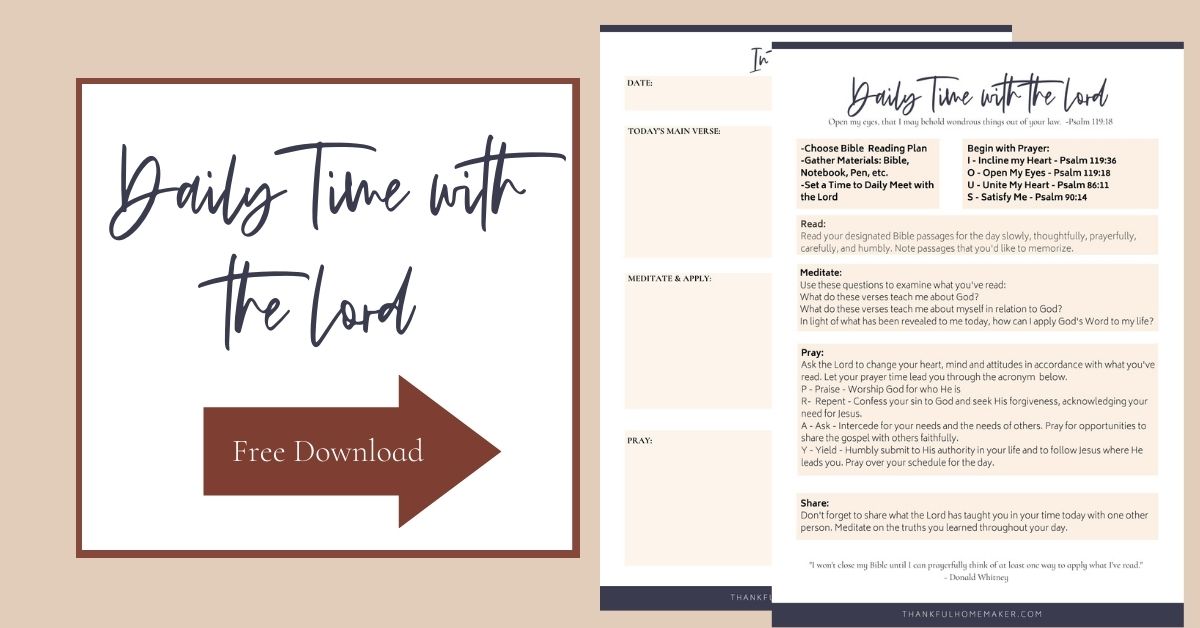EP 61: Fasting: Hungering After God {Spiritual Disciplines Series}

Fasting is a way to show the Lord we enjoy Him more than His gifts. It turns our focus on Jesus because we know He is the only one who can satisfy our spiritual hunger. We desire to be filled with the Lord.
You can read the post below or listen in to the podcast where more content is shared.
Listen & Download the Podcast:
Find All Podcast Episodes or Subscribe to the Podcast.
Related Articles:
Podcast EP 56: Prayer (Spiritual Disciplines Series)
EP 129: Fasting for the Glory of God (Matthew 6:16-18 – Sermon on the Mount Series)
We don’t hear much about Fasting in our Christian circles today. Talking about abstaining from anything in the world comes across as counter-cultural. Other reasons we don’t talk much about fasting is lack of understanding, or it’s not convenient but the main reason for me, and probably for many of you too, is we just don’t fully understand the spiritual benefits of fasting and how to do it.
What is Fasting?:
Fasting is when we voluntarily abstain from food for a spiritual purpose. It can be denying ourselves the enjoyment of other things like social media, television, sleep, hobbies, etc. If you have a medical condition and cannot abstain from food, fasting from something that takes your eyes off Christ is a wise option.
But normally when we think of Christian fasting it is from food for a spiritual purpose. The Bible talks about different kinds of fasts. In Matthew 4:2 Jesus fasted for 40 days and it says He ate nothing during those days but it doesn’t say He didn’t drink.
In the book of Daniel, a partial fast is described from certain kinds of food (Daniel 1:12). Ezra avoided all food and water (see Ezra 10:6) and Esther called for a three-day fast for the Jews in Susa not to eat or drink in Esther 4:16.
These few examples were all for spiritual purposes. Donald Whitney gives several other examples in his book Spiritual Disciplines for the Christian Life. He describes congregational fasts as national fasts and the one we will be talking about today is private individual fasting.
16 “And when you fast, do not look gloomy like the hypocrites, for they disfigure their faces that their fasting may be seen by others. Truly, I say to you, they have received their reward. 17 But when you fast, anoint your head and wash your face, 18 that your fasting may not be seen by others but by your Father who is in secret. And your Father who sees in secret will reward you. ~ Matthew 6:16-18
Why Do We Fast?:
Fasting is a way to show the Lord we enjoy Him more than His gifts. It turns our focus on Jesus because we know He is the only one who can satisfy our spiritual hunger. We desire to be filled with the Lord.
Fasting is a way to show the Lord we enjoy Him more than His gifts.In the Sermon on the Mount the word “when” is used many times instead of “if”. In Matthew 6:16-17 Jesus tells us—“But when you fast”. We’re given specific instructions from Jesus on what to do when we fast (and what not to do) so it is assumed as His followers we will fast.
In Matthew 9:14-15 we are told:
14 Then the disciples of John came to him, saying, “Why do we and the Pharisees fast, but your disciples do not fast?” 15 And Jesus said to them, “Can the wedding guests mourn as long as the bridegroom is with them? The days will come when the bridegroom is taken away from them, and then they will fast.
The time to fast is now as it says in verse 15 from above. Our bridegroom has been taken away and we yearn for His return to make all things right and new.
“Christian fasting, at its root, is the hunger of a homesickness for God.” ~ John Piper, A Hunger for God.
Where Do We Begin?:
It can be too easy to start a spiritual fast and have it become a way to lose weight. Without a biblical purpose for our fast, it’s just going to turn into a self-centered experience.
We need to pray about what the purpose of our fast is.
Donald Whitney shares this helpful template to remind us how to keep our growling stomachs directed on why we are fasting:
“As your stomach growls and you think, I’m hungry! your next thought is likely to be something like, Oh right—I’m hungry because I’m fasting today. Then your next thought should be, And I’m fasting for this purpose_____________________.”
Since I’m on Donald Whitney’s book here is a helpful list of specific spiritual purposes why we fast:
- Strengthening prayer (Ezra 8:23, Joel 2:13, Acts 13:3)
- Seeking God’s Guidance (Judges 20:26, Acts 14:23)
- Expressing Grief (1 Samuel 31:31, 2 Samuel 1:11-12)
- Seeking deliverance or protection (2 Chronicles 20:3-4, Ezra 8:21-23)
- Expressing repentance and returning to God (1 Samuel 7:6, Jonah 3:5-8)
- Humbling oneself before God (1 Kings 21:27-29, Psalm 35:13)
- Expressing concern for the work of God (Nehemiah 1:3-4, Daniel 9:3)
- Ministering to the needs of others ( Isaiah 58:3-7)
- Overcoming temptation and dedicating yourself to God (Matthew 4:1-11)
- Expressing love and worship to God (Luke 2:37)
There are many reasons why we may find ourselves fasting, from the conversion of lost loved ones, strengthening our marriages, church relationships, major decisions we need to make, or the health of loved ones to list just a few. We don’t fast to earn God’s favor—in Christ this was taken care of when we came to the Lord in repentance and faith—we don’t fast to earn God’s acceptance.
Why do we fast? This quote from Donald Whitney sums it up beautifully:
“Fasting can be an expression of finding your greatest pleasure and enjoyment in life from God.”
Matthew Henry states that fasting serves “to put an edge upon devout affections.”
And John Piper states: “This is the essence of Christian fasting: We ache and yearn—and fast—to know more and more of all that God is for us in Jesus. But only because he has already laid hold of us and is drawing us ever forward and upward into ‘all the fullness of God.'”
Start Slow:
Missing a meal can be a bit scary. I personally like to eat. My mindset needs to change on this one. There are so many other things I can go without and not complain about but take away my food and I can begin to feel cranky. That’s a reason to fast on its own. That problem of self!
I do believe the Lord directs us to fast when there is something we need direction or guidance on. It is such a sweet grace the Lord gives us to be able to seek His guidance in this special way.
We’ve talked about the definition of fasting and the purpose so how do we go about getting started? There will not be a perfect day to begin fasting, I can guarantee it. You just need to start.
If you’ve never fasted, begin with maybe just one meal a week and build from there. You need to consume liquids when you are fasting, water for sure but many people use juice to help them to feel better when going without food. John Piper stated he drinks apple juice during his fasts or he wouldn’t be able to go about his daily tasks without that extra help. You may not need more than water but know that is an option. Please seek medical advice before you fast.
The Lord knew fasting was good for His people as He commanded the Israelites to fast for one day a year on the Day of Atonement. As a spiritual discipline fasting is a way we are enabled to grow more in Christlikeness as we seek the Lord in this way. Jesus modeled and taught fasting so we know there are great blessings to it.
As we miss a meal with the hopes of becoming more like Jesus the benefits of fasting will outweigh any anxiety we may have about it.
Plan Your Time:
If you’re skipping a meal what should you be doing? Freeing up the time we would take to be eating meal opens the door to spend time in prayer and meditation on God’s Word. Ponder and pray what your fast is about. Ask yourself what is the spiritual purpose of your fast and design your time around that purpose.
Don’t forget to let close family members know you are fasting if needed. The purpose isn’t to let everyone know your fasting, remember Matthew 6:18, but your people need food, and you may be the one cooking it and they may wonder why you’re not eating with them.
Motives:
This one needs its own section even though it’s brief. It is okay for others to know you are fasting but it becomes an issue of motive when you want people to know you are fasting. People are going to know that is a reality. Only God and you know your true motives. Is it enough for you that just God knows? He is our reward. Is He enough for you?
Types of Fasting:
I’m primarily talking about a private, individual fast but there are many other fasts as we looked at a few at the beginning of the post. You can fast with your spouse, your family, a small group, or your church. There may be specific issues you’re seeking wisdom and guidance on as a group together. John Piper’s church has a weekly fast to pray about keeping the second coming of Christ in view. Fasting together can be a huge blessing.
God-Centered Purpose:
Our hunger during a fast must point us to thoughts of God. It is a reminder to pray and remember why we are fasting.
Fasting is meant to change our hearts. It changes and strengthens our prayer life. It causes us to pray in earnest. It is not a way to persuade God to do things our way.
Here is a helpful word from Donald Whitney:
“There is no doubt that God has often crowned fasting with extraordinary blessings. Biblical, historical, and contemporary testimonies bear witness to God’s delight in providing unusual blessings to those who fast. But we should be careful not to develop what Martyn Lloyd-Jones called a mechanical view of fasting; that is, believing that if we will fast, God is obligated to give us what we ask. We cannot manipulate God to do our bidding by fasting any more than we can by any other means. As with prayer, we fast in hope that by His grace God will bless us as we desire. When our fast is rightly motivated, we can be sure God will bless us and do so in the way infinite wisdom knows is best, even if it is not in the way we wanted.”
Hunger for God:
John Piper’s book on fasting has an appropriate title, A Hunger for God. That is the purpose of fasting too long for the fullness of the presence of Jesus in our lives. To hunger for God more than the food He made for us to live on.
In Christ, we have tasted and seen that the Lord is good. May we yearn and desire more of Him as we practice the spiritual discipline of fasting.
Related Resources:
Spiritual Disciplines for the Christian Life by Donald Whitney
Habits of Grace: Enjoying Jesus through the Spiritual Disciplines by David Mathis
A Hunger for God: Desiring God Through Fasting and Prayer by John Piper
Resource of the Week from the Podcast:
Behold Your God Podcast – Putting on Christ Part One and Part Two







Just found you today! Thankful for your gospel infused content. Praise God for learning about another sister in Christ who is pointing me to a closer walk with Him!
I’m so glad you’re here Terry. Thankful for your encouragement xo.